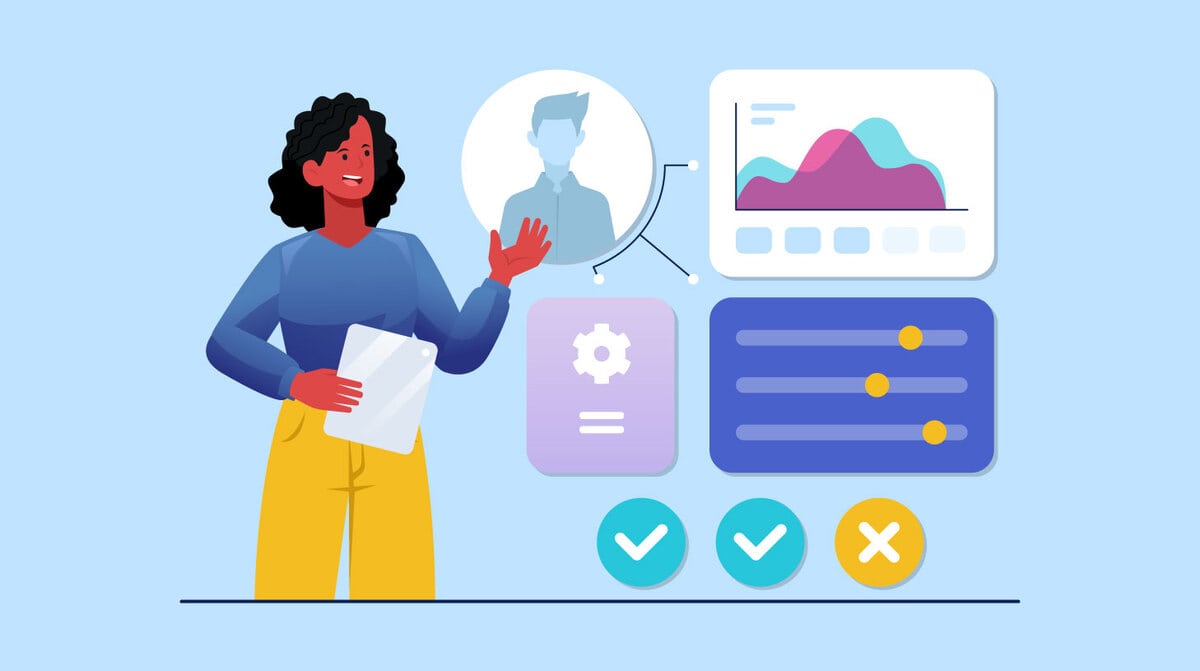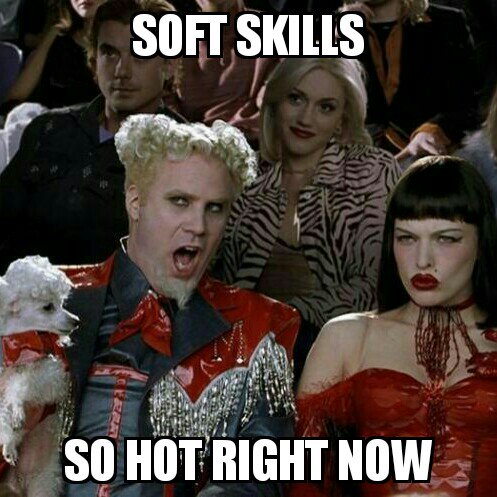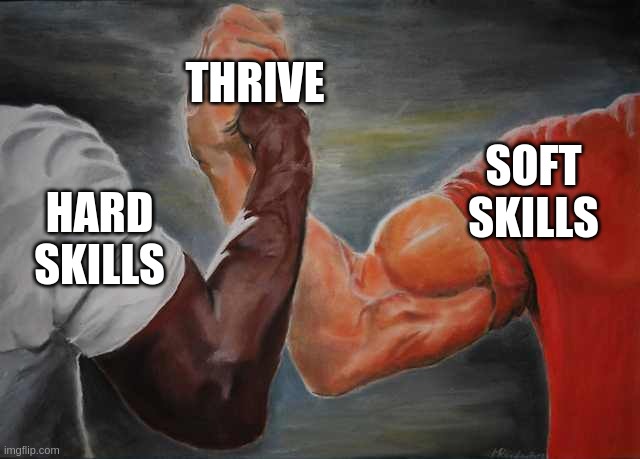How to assess soft skills in a job interview is notoriously difficult for a lot of recruiters. Yet, soft skills are critical for a successful employee and a healthy work environment.
So why is soft skill evaluation so tricky? Are you wondering how to assess soft skills and be sure you made the right choice?
Say no more, we’re here to help.
The Great Divide: Hard vs. Soft Skills
Let’s be real. The majority of companies are hiring for hard skills and experience.
When you hire an experienced person, you know they will perform well, onboarding will be quicker and easier, and the results will come in sooner.
Plus, it’s easy to assess hard skills: it takes a carefully created test, plus a few technical questions during the interviewing process. If a candidate has references or recommendations from previous employers, even better.
But what’s up with soft skills?
It’s equally important that a candidate knows how to communicate, that they are polite, that they can plan their time and tasks properly, and that they know how to resolve a conflict.
Not hiring people with developed soft skills might come with a high price. If you’re an SME, it makes sense you won’t have time to focus on soft skills. Without developed processes and a team of people working to bring the best talent in, you’ll be looking for crucial hard skills only.
But what happens when you progress, your company grows, and you need top-tier talent to scale? Without key soft skills such as communication, time management, and teamwork, times will get rough.
Why are soft skills difficult to assess?
According to research, more than half of the companies said they have a hard time assessing soft skills accurately and mostly rely on social cues (facial expressions, body language, voice) to assess them — meaning, they have no established processes whatsoever. Let’s see why assessing soft skills is so difficult.
1. Soft skills are hard to identify and break down
There’s a lack of standardization and concretization of soft skills. When we speak about them, we speak of vague qualities we appreciate in a candidate. We rarely speak about what exactly we mean by “good time management” or “great interpersonal skills”. We’re not breaking them down into specific components.
On the other hand, recruiters who want to standardize soft skills testing and apply some sort of methodology are afraid that it might make the interviewing process too robotic. To measure soft skills but to remain human and genuine is indeed a challenge.
2. Soft skills rely on personality — a lot
Hard skills can be learned and then applied repeatedly. That way, they become automatized. It’s safe to say that if they put their mind to it, a lot of candidates can acquire a lot of hard skills.
On the other hand, acquiring soft skills takes constant, conscious effort over a long period of time. And the end result will not be the same for every person.
This is because soft skills rely so much on personality.
The people with developed soft skills are the ones who live a conscious life; understand themselves and others; have conscious incompetence (over unconscious incompetence) and therefore strive to improve; are humble enough to commit to lifelong learning; are aware of their capabilities and boundaries; are not led by ego and don’t play games.
Not everyone can do this and that’s ok. But then we need to be aware that not everyone can develop soft skills to the same extent. A balanced mix of hard and soft skills, according to a position, industry, and a candidate’s personality is the best option.
3. Soft skills can be faked in an interview
Candidates know there are standard questions they might get asked, such as behavioral and situational questions. Each of these is aimed at assessing a certain soft skill — candidates can prepare answers in advance to present themselves in the best possible light. And that’s understandable.
But how can you tell if what they’re telling you is true?
It’s hard to know. Sometimes it’s best to admit that hiring is a guessing game and what seemed good on paper will turn out to be disastrous in practice. Therefore, each answer needs to be taken with a grain of salt.
4. Standard ways of soft skills evaluation are questionable
Suppose you google “how to assess soft skills in a job interview”. You’ll come across a bunch of articles that repeat the same pieces of advice:
1) Use personality tests
2) Make candidates rank their soft skills from most developed to least developed
3) Make their reference rank their soft skills from most developed to least developed
4) Ask which soft skills the candidate thinks are going to be crucial in the role they’ve applied for.
It doesn’t hurt to try, but it’s likely that these approaches won’t tell you much.
Take personality tests as an example. In addition to being pricey, they are often not reliable. Experienced recruiters and hiring managers say they are a decent first step to discovering a candidate’s key personality traits, but nothing more than that. It can’t tell you a lot about soft skills because they’re shaped by a person’s work and life experiences which are much more nuanced.
For example, there’s the introvert/extrovert dilemma. Is it really necessary for a candidate to be an extrovert in order to know how to communicate effectively? Not really. A lot of times introverts’ quality of communication is better, it’s only the quantity that lacks.
Generally, recruiters who use personality tests need to be careful, as sometimes this process can be borderline discriminatory. For example, an introvert with anxiety could, hypothetically, sue for not seeming “enthusiastic” enough by making the case that they have anxiety and therefore were being discriminated against. People could make a case that the interviewer violated the Americans with Disabilities Act, so recruiters need to be careful about questions asked and how exactly candidates are evaluated.
How to Assess Soft Skills in a Candidate?
It boils down to intention and explicit effort.
1. Break soft skills down
Choose the key soft skills you’re looking for. Define them, break them down into specific components: what do they entail? How are they displayed? How is the lack of them manifested?
Let’s take effective communication as an example.
What does effective communication mean and how is it displayed? For example:
- The candidate adjusts their language to the level of experience of the person they’re speaking to
- The candidate checks whether what they communicated has been understood
- The candidate successfully sums up the main points they brought up
- The candidate speaks informatively, yet succinctly
- The candidate is not interrupting others while they speak
- The candidate is actively listening to the interlocutor and contributes to the conversation in a meaningful way; they’re not merely waiting for their turn to speak
Then define red flags for a competency — that is, the things that could indicate a candidate does not possess a soft skill or needs to improve it. In our communication example, that might be:
🚩 The candidate uses too many technical terms
🚩 The candidate goes off course and rambles
🚩 The candidate is not able to succinctly present relevant information
🚩 The candidate interrupts the interviewer or other interlocutors
🚩 The candidate often faces misunderstandings around initiatives at work
🚩 The candidate makes assumptions
🚩 The candidate doesn’t maintain eye contact
If you want to assess teamwork, you can break it down like this:
- The candidate communicates effectively with the rest of the team to complete a task
- The candidate is reliable when it comes to time and task management
- The candidate is willing to help a coworker out
- The candidate is not ashamed to ask for help when needed
- The candidate is ready to adjust their schedule in order to compromise
- The candidate nurtures open communication and honest, constructive feedback
Red flags:
🚩The candidate prefers working alone when teamwork is required
🚩The candidate doesn’t provide help to coworkers
🚩 The candidate doesn’t ask for help when faced with a difficult task
🚩 The candidate is unaware of coworkers’ deadlines (if tasks are dependent on each other)
🚩 The candidate does not communicate openly
🚩 The candidate gives no feedback and receives it poorly
🚩 The candidate is prone to gossiping
🚩 The candidate is arrogant and bossy
The key is to break down each competency into concrete bits you can assess with a simple yes/no during the interview. Stick to the same list for the same competency for all candidates and it’ll be easier to make a decision down the line.
2. Don’t hire traditionally
If you open up a job ad and wait for applicants to send their CVs; and then you sort through a pile of CVs and portfolios; and then you proceed to schedule a meeting with them; and then you wonder how to assess their soft skills through the way they talk… you’ll lose a lot of time and you’ll have difficulties finding a decent candidate.
That’s why we recommend making connections and building relationships with candidates in advance, before you’re even hiring.
Take LinkedIn as an example. If a person is on LinkedIn, chances are they’re a step ahead of the others: they took the time to create an account and probably follow what’s going on in their industry daily. If they’re active and post regularly, even better.
So each time you see or hear something interesting, connect with that person. Say hi or engage with their posts. Let them know you’re following their work and they’ll remember you. That way, once you approach them for the new position you want to fill, they’ll be much more likely to be open to the idea because they know you and trust you.
What you’ll get?
An insight into the quality of their soft skills over a longer period of time. Because you won’t be restricted to an hour or two during interviews, you’ll have plenty of time to sit back and observe how a person behaves and reacts.
Consider this approach an experiment that will get you real insights because it’s done in a real situation — no hypothetical or behavioral questions on interviews, and no way for a person to fake it.
A great potential candidate will display a wide array of qualities. They’ll be:
- Active on LinkedIn and other relevant social media platforms and forums where they share their knowledge and build their personal brand
- Pleasant and approachable in communication; open to making connections and exchanging ideas and experiences with people in and outside of their industry
- Focused on growth and publicly sharing their wins and failures; do not shy away from talking about their failures and how they helped them improve
- People-oriented, gives credit to coworkers and partners, praises them or openly shows support
- Tolerant and understanding of other perspectives and opinions; doesn’t reject other people’s experiences and opinions even if they differ from their own
- Reasonable and neutral in their argumentation, don’t take extreme stances or strip down a situation to a black-or-white approach, and similar.
Building connections before hiring will make sourcing easier for you. You’ll decrease the time to hire, you’ll have top candidates at hand as you already formed a relationship with them, and it will be easy to do outreach.
So if you read something good, or listen to an interesting podcast, or if there are companies that are achieving awesome results — connect with those people.
3. Organize paid projects and trial weeks
Some companies, like Toggl and Basecamp, invite their top candidates for a paid probationary period where candidates get to experience the company and coworkers in a real setting. It’s called a “test week” or a “trial week” or similar.
Just because someone has a strong portfolio and track record, doesn’t mean they will do well in your company. This is why trial weeks are probably the best way to assess candidates’ hard and soft skills, whether they’re a culture fit, and how they get along with a team.
On the other hand, brands like Coca-Cola organize group interviews. They invite several candidates, give them a project to work on, and monitor the situation. Who’s speaking the most? Who is taking initiative? Who’s staying aside? Who’s strategizing? Having candidates that made it to the final round participate in a mutual project will reveal a lot of things that would otherwise remain invisible.
So if you have the time and means, this might be a useful way to test candidates’ soft skills. If you decide to try it out, here are some tips to consider:
- Make sure the trial period/project work is properly compensated; you don’t want people to do free work for you. Not only is it not fair but it also damages your reputation.
- Create a clear, documented process: include details such as who’ll work with this person; what projects they will be working on; what the main KPIs are; what’s acceptable vs. what’s unacceptable, etc.
- Check in regularly: have a dedicated person who will get in touch with a candidate on a regular basis, be a point of contact for all information and questions a candidate might have, provide timely feedback, mentor the candidate on key competencies, etc.
- Evaluate the candidate at the end of the trial period and provide detailed feedback on both the candidate’s strong points and areas to improve.
There are some drawbacks to this approach: if you’re a remote company, it might be more difficult to track candidates’ activities and how they get along with other people; passive candidates are difficult to include (they already have a job; they don’t want to invest the time); and similar. In that case, trying to shorten the trial period to at least one day might be better.
4. Use behavioral and situational interview questions
Behavioral and situational interview questions are a good way to assess whether a candidate has certain soft skills and to which extent they’re developed.
Behavioral interview questions are based on their past experiences and situational interview questions are focused on a hypothetical situation to see how a candidate might react and what they might do.
Pay attention to the way you phrase these questions. Don’t ask “Tell me about your leadership style”. It’s narrow, taken out of context, and you won’t hear many details or get a real picture of a candidate’s leadership skills.
Instead, ask them about a specific situation in which they displayed a specific skill: “Tell me about a project where you had to take the lead”. This is better because:
- It sets their skill within a context
- It shows you how they use a skill in real life
- The answer will provide more detail
- The answer will tell you about several different skills because working in a team requires effective communication, teamwork, time management, leadership, and much more
You’ll need to prepare in advance if you’re using these questions. Create a list of core competencies you want to know more about, break them down the way we described in section 1), and prepare a list of questions that will help you assess their soft skills.
If you’re interviewing experienced candidates, it might be easier to come up with questions on the spot — depending on what they’re telling you. But if you’re interviewing juniors or people with no experience at all, you will need to prepare a list of specific questions.
That’s because it’s likely you won’t discover what you want to know based on their (meager) experience. Among others, situational questions might be convenient because they’re not based on their past experience. But there are a lot of ways to connect their educational background (or work experience, even if it’s limited) to the role they’ve applied for.
Here are some examples of questions to ask candidates with little to no experience:
- Your manager assigned you a task but you don’t know where to start. What do you do?
- A coworker is ignoring you but you need to complete a project with them. What would you do?
- Tell me about your educational background. How does it relate to this particular position?
- Are there any internships or class projects that prepared you for this role?
- How would your classmates describe your work style?
- Tell me about a time when you handled a tight deadline.
Make use of scorecards
You can also use scorecards for different interview rounds. In the early stages of the interviewing process, you can assess the general soft skills relevant to any position (teamwork, interpersonal skills, communication, work ethic) and get more position-specific as you approach the last round (leadership and organizational skills (for management positions), creativity (for marketing positions), persuasion (for sales positions).
If you’re hiring for a team leader, for example, in the last round you can look for these green flags:
- The candidate is comfortable with being held accountable for an entire team’s actions and results
- The candidate can think strategically, provide new ideas, and see through their realization
- The candidate is able to take care of each individual in the team
- The candidate fosters transparency and accountability
- The candidate is proactive instead of reactive
- The candidate is focused on solutions rather than problems
- The candidate resolves conflicts successfully
- The candidate recognizes potential and can mentor juniors
- The candidate spots and rewards a great performance
- The candidate delegates smartly
Red flags:
🚩 The candidate is disorganized
🚩 The candidate micromanages
🚩 The candidate shows signs of arrogance
🚩 The candidate has unrealistic expectations
🚩 The candidate can’t accept responsibility
🚩 The candidate avoids conflict or is hostile/aggressive
🚩 The candidate disregards teammates’ feelings
🚩 The candidate is not transparent (doesn’t set clear expectations and criteria for performance reviews, bonuses, promotions, etc.)
Using the scorecards for each interview round can help you set clear criteria for each soft skill. It can also help you understand and get rid of your own biases, making the hiring process more equitable for all candidates.
Bottom Line
If you’re wondering how to assess soft skills in an effective way, we get you. It’s definitely not easy. By nature, they are difficult to measure objectively. Because of this, a lot of recruiters tend to focus on hard skills only.
The key to measuring soft skills is to take concrete, practical steps and stop relying on social cues.
We hope this article cleared the way for you and introduced new approaches you can start exploring today.





